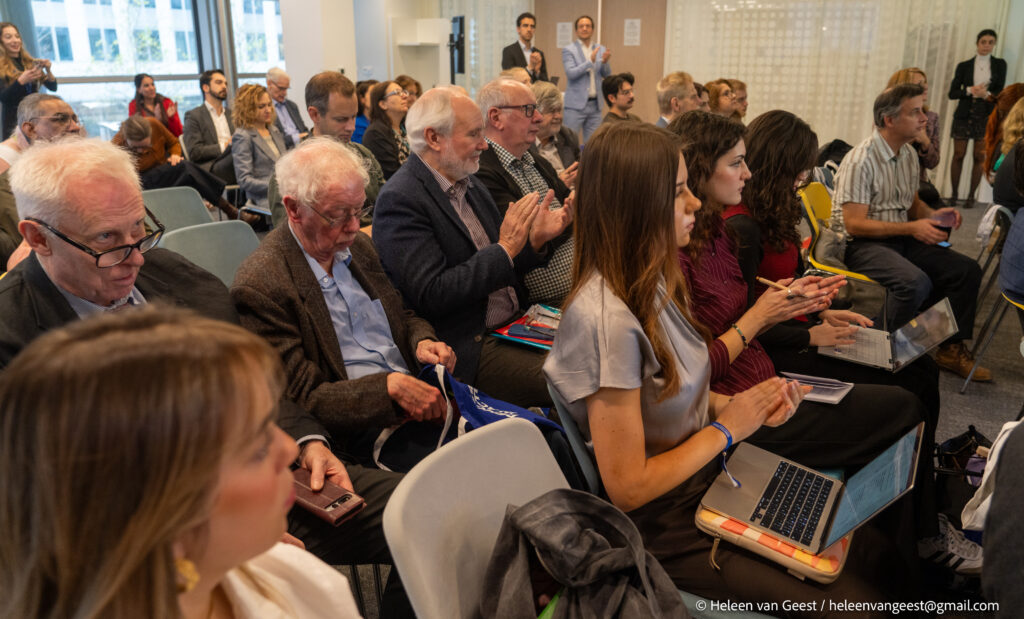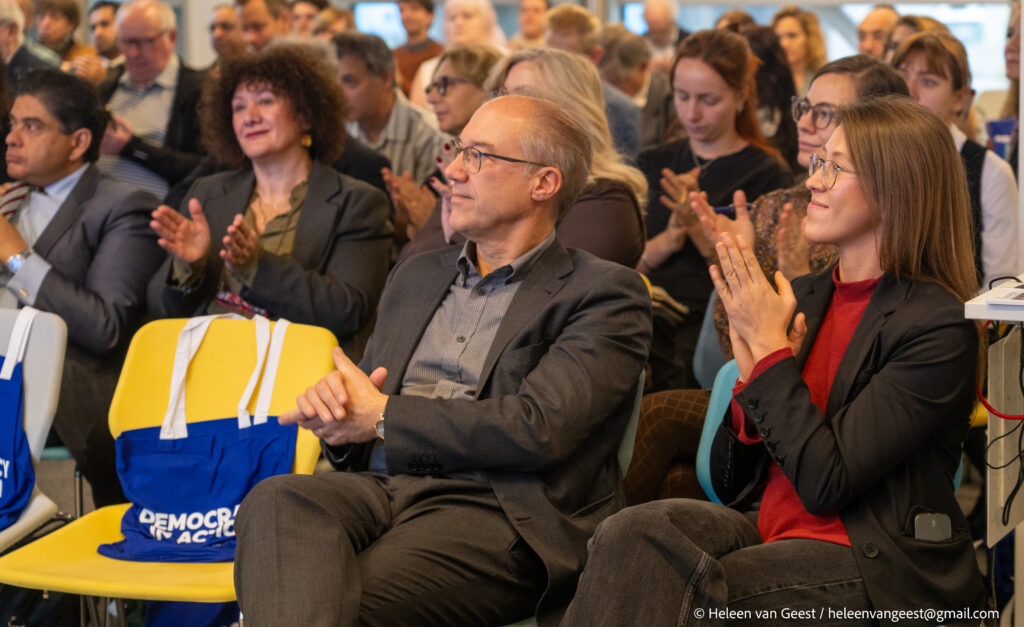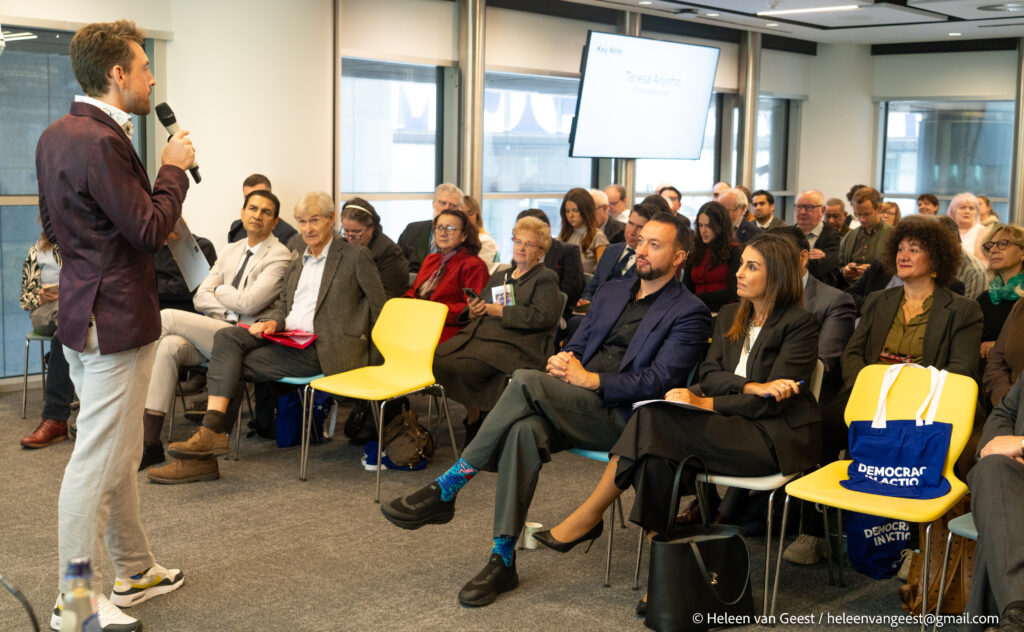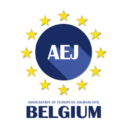By AEJ Belgium member Julian Hale

Threats to media independence (including the rise of disinformation and political pressure), the safety and security of journalists, the disruptive impact of technology and AI, plus the importance of collaboration, were major discussion points during the conference of the Association of European Journalists (AEJ) at the European Parliament’s Info Hub on Friday (14 November). The event kick-started a weekend of activities, including the AEJ’s General Assembly on Saturday and a range of cultural events.
Friday’s discussion, which brought together journalists from across the EU, was dynamically moderated by Rogier Elshout.
Polarisation, disinformation and pressure on media independence
In opening remarks, Arber Hitaj, AEJ International president (Albanian section) referred to surveillance, content manipulation and censorship as among the problems raised by the Freedom on the Net 2025 report, produced by the US think tank Freedom House. The report says that “the immediate future of internet freedom will depend on how governments deploy incentives for and controls over the next wave of technological innovation”.
“We are facing new forms of polarisation, disinformation and pressure on journalistic independence,” said AEJ Belgium president Elena Sánchez Nicolás. Whilst acknowledging the recent adoption of the European Media Freedom Act and the Anti-SLAPP (Strategic Lawsuits Against Public Participation) Directive [SLAPPs are being used to intimidate journalists] as “important steps” in ensuring media independence across Europe, she added: “But, as we all know, legislation is only one part of the story and the real work lies with us. It’s how we practise journalism every day and how we maintain the public trust in media in an era of rapid technological and social change”.
Access to documents and ‘revolving doors’
In a keynote speech, Teresa Anjinjo explained that, as European Ombudswoman, she oversees the whole EU administration, handling complaints on issues such as access to documents, integrity, procedural fairness and the management of EU grants. Aside from her work in pushing the European Commission to be quicker in providing access to documents, she also has the power to start investigations on her own initiative, without waiting for a complaint. Her first one is focused on how EU agencies manage ‘revolving doors’, when officials move from public office to private sector roles.
“At first glance, this might seem abstract, but it affects very important areas, from medicine and food safety to cyber security and defence. It is important that the public can trust that these agencies are operating at the highest ethical standards. Other inquiries I’ve looked at are Frontex and fundamental rights, the transparency of tobacco lobbying, and more recently, how the EU makes its laws, a crucial area for citizens’ trust and engagement,” she said.
European Parliament no longer a ‘two-horse race’
“In this day and age, our daily agenda is dominated by news from the White House and every twist and turn post on Truth Social. But the political life and activity at this side of the on this side of the Atlantic is no less interesting,” said the European Parliament’s head of press, Neil Corlett. “You only have to follow the activity of the European Parliament this week. We had a packed press gallery waiting on every every twist and turn of the plenary voting sessions, which were very tightly fought [on climate targets and on company’s due diligence in their supply chains].” He added that, in years gone by, “there were two dominant political forces [the European People’s Party and the Socialists and Democrats] in the House, and if they agreed, the outcome was almost a given, almost predictable. Nowadays, nothing is given”.

Daphne Caruana Galizia Prize and collaboration among journalists
Corlett went on to say that the Parliament has frequently reiterated its concern and support for journalists and media freedom, including establishing a prize for investigative journalism, named after the murdered Maltese journalist, Daphne Caruana Galizia.
Pan-European collaboration was key as investigative media outlet Follow The Money won this year’s prize for an investigation into the Russian ‘shadow fleet’ (which is being used to evade sanctions). The investigation was a cross-border collaboration with 13 other news outlets around Europe and more than 40 journalists, even beyond Europe. As for the impact of the investigation, Birte Schohaus, Deputy Editor-in-Chief of Follow The Money, said that it raised the question of whether there needs to be more rules in order to prevent Western ship owners from selling vessels to the shadow fleet. “One of the most important things is that people are aware of this now. Governments are aware of this now, and they can’t say: ‘we didn’t know’,” she said.
Collaboration among young journalists is in full swing via the Sphera Network, which has received seed financial support from the European Commission. Its aim, as explained by co-founder Francesca Festa, is “to represent young generations and make their voices heard, on the environment, social justice, identities and human rights”. “We know our audiences, we know what the needs of the younger generation today are and we are able to expand this knowledge to other media. This year, for example, we started a new collaboration with some media outside the network [from Ukraine, Estonia and Lithuania] to see together if we are able to create […] a mutual shared infrastructure that can unite all the small and medium-sized independent media across Europe,” she said.
On journalists working together, Ms Schohaus said that, in the past, people would say that, “if you want to coordinate a collaboration of journalists it’s like herding cats because everyone’s doing what they used to do and on their own”. She has seen a shift as, when she started in journalism “it was really very much everyone was protecting their own sources, working for their own outlet and now younger generations are much more used to collaborating”. Stressing the importance of competition between media outlets, she said that “you can also have competitive media outlets and for them to still work together”, which she is seeing happening more and more.
Renate Schroeder, director of the European Federation of Journalists, which represents over 296,000 journalists in 74 journalists’ organisations across 44 countries, set out her highlights from and take on the Media Industry Outlook, a study commissioned by the European Commission.
- TV and broadcasting are still number one in Europe when it comes to access, closely followed by social media.
- Public service media are still the most trusted.
- 60% do not trust the media, which rings alarm bells: More and more people go to social media knowing it is not trustworthy, but they trust the media even less.
Meanwhile, 44% think journalism plays a positive role, while 25% think that journalism is harmful and spreads lies.
She sees threats to the media from all sides, AI, smear campaigns by politicians, SLAPPs, online harassment, a ‘brain drain’ where EFJ studies show that women journalists are leaving the profession. “Sometimes I wonder why we still have so many journalists doing their job with the little income they get,” she said.
With regard to the Daphne Caruana Galizia prize, she lamented the fact that the mastermind behind her murder is still not behind bars. She also said that journalists are frustrated by the ‘impunity culture’, e.g. in Serbia currently, “where journalists are being bashed on all levels and the police is just watching […]”.
Commenting on AI, she said that journalists have to adapt to the changing world, with the EFJ holding a workshop in Copenhagen recently about how to best use AI tools. One participant said that “with artificial intelligence, we’ve got to learn to embrace the best of what it can do because, if we don’t, then we will be sidelined. And we’ve just got to keep doing what we’ve always done, which is to be creative, to be probing, to hold people to account and to produce high-quality original content.

Business models and funding for media
She also referred to an EFJ study on news deserts in local areas, commenting that “it’s devastating how many local areas don’t have any independent news anymore. And there is no private money that can come up for that”. She called for “some sort of public funds at arm’s length” to deal with that issue. “Of course, it’s very often difficult because you depend on grants and grants are not sustainable. Journalists are not made to deal with grants and all this administrative work. So there is I think a lot of reform to be done. She said that there are a lot of politicians, including France’s President Emmanuel Macron, asking for public funding for public interest journalism. “So this combination of public, private and philanthropic funding I think is very, very important,” she said.
In terms of business models, Follow The Money has a very strict no-advertisement policy because it sets considerable store by its independence. “We want to be able to hold everyone to account, so also big companies. That’s a big part of our work. So if you have advertisements from specific parties, companies, that might give readers the idea that we’re not as independent as we are,” said Ms Schohaus. Another reason for its policy is that it wants to be sustainable because advertisement revenues are changing, with advertisement revenues in newspapers have diminished a lot. “We don’t want to be dependent on that and the same goes for subsidies. I think they’re very much needed for start-up journalist journalistic platforms,” she said. Regarding subsidies, “I think a lot of our readers are very critical about the EU or governments,” she said. In that context, if they see that Follow The Money is subsidised by the EU, they may think that the EU “has a say in what we investigate and we really want to avoid that”, she added.
European model of individual freedoms, participatory/parliamentary democracy
The head of the European Parliament Info Hub, Piotr Bartoszewicz-Malicki, said: “I believe your role [as journalists] is also more and more important because of the global landscape. We have this definite promotion of authoritarian and top-down approach to governance being promoted all around the world. And I think it’s the duty of Europe to show that the model of individual freedoms, participatory democracy and parliamentary democracy is valid and that it can deliver.”
Inviting journalists and the general public to visit the Info Hub and explore its information offering, he said: “We believe firmly that each visitor is also a multiplier and that there is merit also in a bit of whispered communication. If people leave the Info Hub and our premises of the European Parliament feeling happy and well cared for and respected, I think it also contributes to the general vision and image of the EU.”
AI: Real images, not deepfake images
The event was rounded off with a talk by National Geographic explorer, photographer and writer Justin Jin, who explained that, as a Reuters graduate trainee at the start of his career, the values of accuracy and balance were really drilled into him. The threat posed by deepfake AI images put out on social media is, as is well known, very real. Displaying stunning photos taken of the Arctic in his exploration of energy and geopolitics, he explained how he makes it a condition of his work that every photo is real and unmanipulated.
National Geographic, he said, want every frame shot in sequential order. “So I come back typically with twenty, thirty thousand frames per story. I send the whole thing in a hard drive by DHL to them in Washington DC so that the editor can see that I have not manipulated anything. […] that the aura came from this side and ended up on that side. […] everything is traceable in the raw file. This is how strictly we work. And this is the ultimately the book that I made for the hydrogen industry.”
His conclusion: Journalism has entered a post-ethical phase. “Postmodernist journalism no longer, in my view, promises incontrovertible truths. Rather, it may offer perspectives. […] my theory is that it is our role to present these perspectives in the most accurate, balanced and fair way.”

